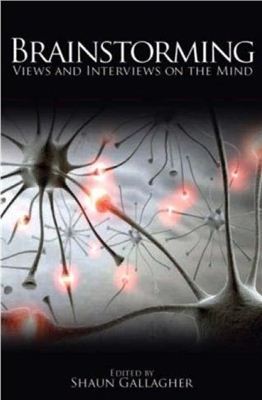Imprint Academic, 2008, 276 pages
Gallagher presents a collection of dialogues between himself and a number of neuroscientists, including Michael Gazzaniga, Marc Jeannerod, and Chris Frith, on the relation between the mind and brain.
Shaun Gallagher has put together a great book here. They greatest feature of Brainstorming is that Gallagher hasn't just thrown a bunch of random quotes together; it is obvious that he took the time to methodically lay out his approach and make his argument.
So what is the argument? Essentially that Computationalism is quite futile in its attempt at explaining most, if any, of the properties of consciousness while Embodied Cognition is more fruitful. To make this argument Gallagher draws from interviews, dialogues and exchanges between various professionals working on the problem of consciousness. They are: Michael Arbib (Action to Language via the Mirror Neuron System), Jonathan Cole (The Invisible Smile: Living without facial expression), Christopher Frith (Making up the Mind: How the Brain Creates Our Mental World), Michael Gazzaniga (Human: The Science Behind What Makes Us Unique), Marc Jeannerod (Motor Cognition: What Actions Tell to the Self (Oxford Portraits in Science)), Anthony Marcel, Jacques Paillard (Brain and Space (Oxford Science Publications)), Jaak Panksepp (Affective Neuroscience: The Foundations of Human and Animal Emotions (Series in Affective Science)) and Francisco Varela (On Becoming Aware: A Pragmatics of Experiencing (Advances in Consciousness Research, 43)).
This book is very informative in the ongoing debate about Mind/Body, the "hard problem of consciousness", computationalism, embodied cognition and phenomenology.
Gallagher presents a collection of dialogues between himself and a number of neuroscientists, including Michael Gazzaniga, Marc Jeannerod, and Chris Frith, on the relation between the mind and brain.
Shaun Gallagher has put together a great book here. They greatest feature of Brainstorming is that Gallagher hasn't just thrown a bunch of random quotes together; it is obvious that he took the time to methodically lay out his approach and make his argument.
So what is the argument? Essentially that Computationalism is quite futile in its attempt at explaining most, if any, of the properties of consciousness while Embodied Cognition is more fruitful. To make this argument Gallagher draws from interviews, dialogues and exchanges between various professionals working on the problem of consciousness. They are: Michael Arbib (Action to Language via the Mirror Neuron System), Jonathan Cole (The Invisible Smile: Living without facial expression), Christopher Frith (Making up the Mind: How the Brain Creates Our Mental World), Michael Gazzaniga (Human: The Science Behind What Makes Us Unique), Marc Jeannerod (Motor Cognition: What Actions Tell to the Self (Oxford Portraits in Science)), Anthony Marcel, Jacques Paillard (Brain and Space (Oxford Science Publications)), Jaak Panksepp (Affective Neuroscience: The Foundations of Human and Animal Emotions (Series in Affective Science)) and Francisco Varela (On Becoming Aware: A Pragmatics of Experiencing (Advances in Consciousness Research, 43)).
This book is very informative in the ongoing debate about Mind/Body, the "hard problem of consciousness", computationalism, embodied cognition and phenomenology.

